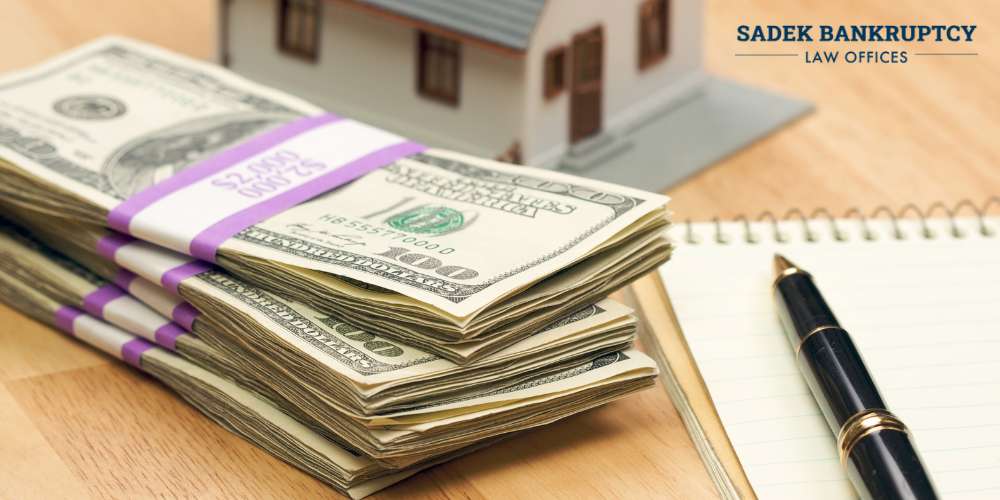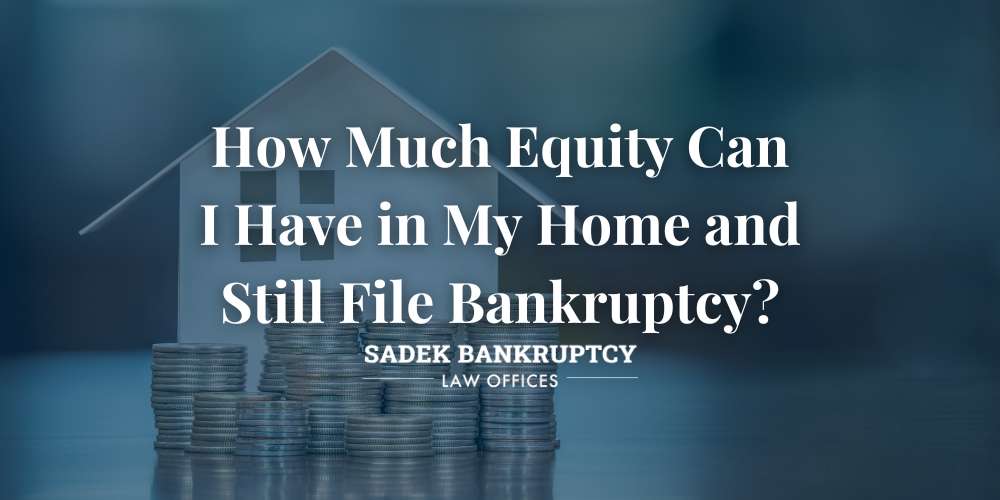Table of Contents
Understanding Home Equity in Pennsylvania and New Jersey Bankruptcy Filings
Struggling with debt and worried about losing your home? One of the most pressing questions for homeowners considering bankruptcy is, “How much equity can I have in my home and still file Chapter 7 or Chapter 13?” Your home is one of your most valuable assets, and understanding how equity impacts your ability to achieve debt relief is crucial.
We’ll break down the rules for protecting your home under Pennsylvania, New Jersey, and federal exemption laws, helping you navigate your options with confidence. If you’re ready to take the next step, contact Sadek Bankruptcy Law Offices for experienced legal guidance. Our knowledgeable team is here to help you protect your home while finding a path toward financial freedom.
How Do Chapters 7 and 13 Affect Home Equity?
Chapters 7 and 13 bankruptcy impact home equity differently, depending on your financial situation and goals. In a Chapter 7 filing, home equity is evaluated against available exemptions to determine whether your property can be protected from liquidation.
If your home equity exceeds the allowed exemption, the bankruptcy trustee may sell the home to repay creditors. However, mortgage payments must still be current to prevent foreclosure, as Chapter 7 does not modify secured debts like mortgages.
In Chapter 13 bankruptcy, home equity plays a role in the repayment plan calculation when filing bankruptcy. This type of filing allows you to keep your home and catch up on overdue mortgage payments through a structured payment plan lasting three to five years. Unlike Chapter 7, Chapter 13 protects your home from liquidation, even if your equity exceeds exemption limits, as long as you adhere to the repayment terms.
How Much Equity Can I Have in My Home and Still File Chapter 7?

Chapter 7 bankruptcy, also known as liquidation bankruptcy, allows individuals to discharge unsecured debts like credit card balances or medical bills by selling nonexempt assets. A critical factor in determining whether you can retain your home during this process is the bankruptcy exemption for home equity.
If the equity in your home exceeds the allowed exemption, the trustee may sell the property and nonexempt equity to pay unsecured creditors. However, exemptions vary by state and federal law, which means the amount of equity you can protect depends on your location and the exemption rules you choose to apply.
Below, we’ll explore the homestead exemptions available in Pennsylvania, New Jersey, and under federal laws, to help you understand your options.
Pennsylvania’s Homestead Exemption
Pennsylvania does not offer a significant homestead exemption for residents filing Chapter 7 bankruptcy. This lack of protection often means individuals with significant equity in their homes may need to rely on other strategies, such as opting for federal exemptions, to safeguard their property. Despite this, Pennsylvania homeowners should consult with a bankruptcy attorney to explore all possible options for protecting their home in bankruptcy.
New Jersey’s Homestead Exemption
New Jersey does not have a state-specific homestead exemption for bankruptcy filings. However, residents may choose to use the federal homestead exemption, which provides some protection for home equity during the bankruptcy process. The lack of a state exemption highlights the importance of understanding the exemptions available and selecting the right option for your circumstances during a bankruptcy filing.
Federal Exemptions
Under federal law, homeowners can use the federal homestead exemption during a bankruptcy proceeding to protect a portion of their home equity. Federal laws currently allow for an exemption of up to $27,900 (as of 2024) for individuals, with double that amount available for married couples filing jointly.
This exemption can be a critical tool for safeguarding home equity during a liquidation bankruptcy, especially for those residing in states without substantial homestead protections.
How Much Equity Can I Have in My Home and Still File Chapter 13?
In Chapter 13 bankruptcy, the amount of equity you have in your home does not prevent you from filing but does affect your repayment plan. Unlike Chapter 7, Chapter 13 bankruptcy allows you to keep your home as long as you include any nonexempt equity in the repayment plan. This means that if your home equity exceeds the allowed bankruptcy exemption, you must pay creditors an amount equal to or greater than the nonexempt equity over the course of the plan.
The repayment plan lasts three to five years, during which you can also catch up on overdue mortgage payments and address other debts. By combining the protections of bankruptcy exemptions with the structured repayment terms, Chapter 13 can provide a pathway to retain your home while managing your financial obligations.
Calculating Home Equity for Your Bankruptcy Case

Home Equity = Current Market Value of Your Home – Total Outstanding Mortgage and Liens
For example, if your home is worth $300,000 and you owe $200,000 on your mortgage, your home equity would be:
$300,000 – $200,000 = $100,000 in equity.
Calculating your home’s equity is a crucial step when preparing for a bankruptcy case. Home equity is determined by subtracting the outstanding balance of your mortgage and any other liens from your home’s current market value.
Accurately calculating your home’s equity helps determine whether it falls within the limits of the applicable homestead exemption, which protects a portion of your equity from creditors.
A Philadelphia bankruptcy lawyer with Sadek Bankruptcy Law Offices can assist in evaluating your equity and ensuring you use the correct exemption rules, whether federal or state, to safeguard your property.
In some cases, determining a home’s equity may require a professional appraisal to obtain an accurate market value, especially if property values have fluctuated. Working with a bankruptcy lawyer ensures that the calculation is thorough and defensible in court, reducing the risk of disputes with the bankruptcy trustee.
Properly identifying your home’s equity and applying the homestead exemption are essential steps for protecting your home and navigating the Pennsylvania bankruptcy process successfully.
Home Equity and Bankruptcy FAQs
Will I Lose My House If I File Chapter 13?
You are unlikely to lose your house if you file Chapter 13, as this type of bankruptcy is specifically designed to help you keep your property while managing your debts. During the bankruptcy proceeding, you will work with a bankruptcy trustee to create a repayment plan that allows you to catch up on overdue mortgage payments and address other debts over three to five years. As long as you stay current on your repayment plan and meet its terms, Chapter 13 provides a pathway to protect your home from foreclosure.
Can a Trustee Make Me Sell My Home to Pay Creditors Even If I Qualify for a Bankruptcy Exemption?
If you qualify for a bankruptcy exemption that fully covers your home equity, the bankruptcy trustee cannot make you sell your home to pay creditors. Exempt assets, like equity protected under a homestead exemption, are shielded during the bankruptcy process, meaning the trustee cannot liquidate them to satisfy debts.
However, if your home equity exceeds the exemption limit, the nonexempt portion may be subject to sale in a Chapter 7 case. In Chapter 13, the excess equity would instead be factored into your repayment plan, allowing you to keep your home while addressing creditor claims.
What Happens to Mortgage Payments When You File Bankruptcy?
When you file bankruptcy, the treatment of mortgage payments depends on whether you file Chapter 7 or Chapter 13 bankruptcy. In Chapter 7 bankruptcy, you must continue making regular mortgage payments if you want to keep your home, as this type of bankruptcy does not modify secured debts. Failure to stay current may lead to foreclosure.
In Chapter 13 bankruptcy, past-due mortgage payments can be included in the repayment plan, allowing you to catch up over three to five years while also continuing regular payments on your mortgage. This structured approach provides an opportunity to save your home while addressing other financial obligations.
Contact a Pennsylvania and New Jersey Bankruptcy Attorney at Sadek Bankruptcy Law Offices Today
If you’re ready to take control of your financial future and protect your home, an experienced Pennsylvania and New Jersey bankruptcy attorney at Sadek Bankruptcy Law Offices is here to help. We have a deep understanding of bankruptcy law and can guide you through the process of securing debt relief while safeguarding your assets.
Whether you’re considering Chapter 7 or Chapter 13 bankruptcy, our team will provide personalized advice and support every step of the way. Contact us today to schedule a free consultation and learn how we can help you achieve a fresh financial start.





